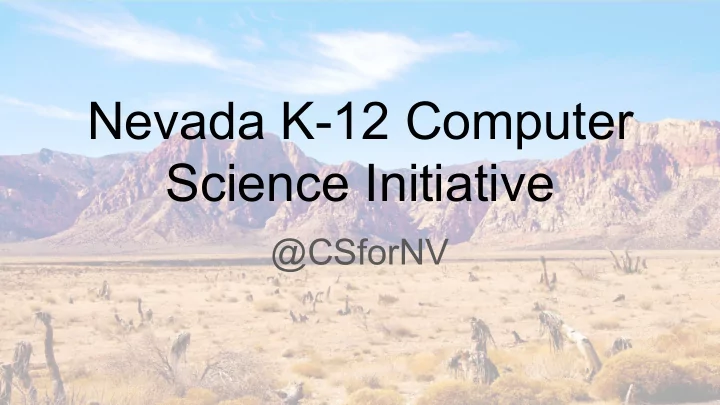

Nevada K-12 Computer Science Initiative @CSforNV
A Changing Job Market Computers continue to radically change our world creating a future where every job will be a computer-based job. #CSforNV | @CSforNV
A Changing Job Market Advances in Artificial Intelligence threaten to eliminate up to 47% of current jobs*. * Frey, Carl Benedikt, and Michael A. Osborne. “The Future of Employment: How Susceptible Are Jobs To Computerisation?” 17 Sept. 2013, pp. 1–72., https://www.oxfordmartin.ox.ac.uk/downloads/academic/The_Future_of_Employment.pdf. #CSforNV | @CSforNV
K-12 CS Education in Nevada Very few students have access to K-12 Computer Science which leads to: ● K-12 no longer providing the well-rounded education needed for this century ● Too few students entering computer science creating workforce shortages ● Lack of gender and ethnic diversity / people with disabilities in the workforce #CSforNV | @CSforNV
Ground-breaking legislation Senate Bill 200 introduced and passed to address these issues in Nevada. (Includes $2.4 million for implementation) #CSforNV | @CSforNV
Senate Bill 200 Highlights of SB 200: 1. Creates Computer Science Sub-Committee of the Nevada STEM Advisory Council 2. Adds K-12 Academic Content Standards in Computer Science 3. Starts basic computer literacy in elementary school 4. Computer Science can count as a 4th math or 3rd science credit 5. All high schools must offer an approved Computer Science course 6. High school Computer Technology graduation requirement will contain Computer Science #CSforNV | @CSforNV
1. K-12 Computer Science Sub-Committee ● This is a sub-committee of the Nevada STEM Advisory Council ● It consists of members from K-12, Higher Ed, State Board of Education, Nevada DOE, Business, and Community ● Its role is to advise the State Board of Education, School District Trustees, State Charter Authority, Academic Standards Council, and the Commission on Professional Standards. ● It advises on Computer Science curriculum, courses, professional development, and teacher licensing ● Aligns with national best practices (Expanding Computing Education Pathways) #CSforNV | @CSforNV
2. Academic Content Standards in Computer Science ● Academic Content Standards define WHAT every K-12 student needs to know and be able to do; while curriculum is the HOW . ● Nevada participated in the development of the National K-12 CS Framework* defining high level concepts and practices along with: ○ Sixteen states, NYC, and San Francisco ○ Apple, Google, Amazon, Microsoft ○ ACM, Computer Science Teachers Association, Code.org ● K-12 CS Standards were developed by a diverse team of 31 Nevada content specialists from across the state. ● The team used the K-12 CS Framework as a starting point. * K-12 Computer Science Framework. (2016). Retrieved from http://www.k12cs.org. #CSforNV | @CSforNV
3. Basic Computer Literacy in Elementary School ● Students will receive computer education and technology instruction, including computer science, prior to sixth grade ● Students need these skills to take online tests starting in 3rd grade ● Helps reduce technology opportunity gaps ● Helps students garner early knowledge about computers ● Creates the early Computational Problem Solving skills needed for more advanced Computer Science topics. #CSforNV | @CSforNV
4. CS course can count for math or science ● A rigorous computer science course can count as a 4th Math or 3rd Science (only one) towards graduation ● Students MUST pass Algebra and Geometry. To be accepted as Math for Higher Ed, students must also have at least completed Algebra II ● It can be an AP course, CTE course, or dual enrollment college course ● This does NOT count towards the Math and Science requirement for the STEM seal* *http://bit.ly/SB241-STEMSeal #CSforNV | @CSforNV
5. High Schools must offer Computer Science ● This applies to both traditional public schools and charter schools ● The course must be approved by the State Board of Education ● The use of an online course is acceptable ● Schools must make an effort to expand the enrollment of girls, underrepresented minorities, and children with disabilities #CSforNV | @CSforNV
6. Graduation requirements to contain CS ● The ½ credit high school computer technology requirement will be updated to contain CS. ● The exact amount of CS content will be determined by the State Board of Education. ● Nevada will be one of few states where every student learns some Computer Science. ● It’s important to guarantee equity and access to technology careers. #CSforNV | @CSforNV
State General Fund Appropriation ● $2.4 million over 2 years ● Districts are now required to use this appropriation to provide teacher training and development in computer science. ● By district: Clark County SD - $1.5 million, Washoe County SD - $300,000 ● Other districts and charter schools - $600,000 as noncompetitive grants #CSforNV | @CSforNV
Implementation Timeline POINTS OF THE BILL IMPLEMENTATION TIMELINE Academic Content Standards developed July 1, 2018 CS Sub-Committee formation July 1, 2017 Computer Literacy in Elementary School July 1, 2018 CS as 4th math or 3rd science (HS grad) July 1, 2017 CS as entry for Higher Ed July 1, 2020 All high schools offer Computer Science July 1, 2022 HS computer technology grad req has CS July 1, 2018 #CSforNV | @CSforNV
Contact Information Mark Newburn - Nevada State Board of Education mnewburn@doe.nv.gov Cindi Chang - Nevada Department of Education - Programs Professional over Computer Science/STEM cchang@doe.nv.gov | 702.486.7952
Recommend
More recommend